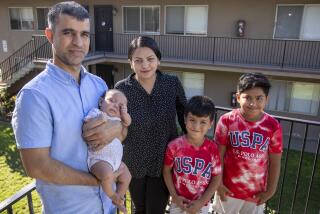Father Held in Son’s Death a Tragic Study
- Share via
A physician arrested in the killing and dismemberment of his 11-year-old son was portrayed Thursday as a man who, after immigrating to the United States from his native Pakistan, gradually turned from the teachings of a strict Muslim sect to alcohol and pornographic movies.
Dr. Khalid Parwez ultimately found his marriage ruined and was locked in a bitter custody fight, marked by charges from his former wife, Amtul Parwez, 30, that he had gradually turned away from the religious teachings of the Ahmedia sect.
Parwez, 38, booked for investigation of murder, was held without bail for a second day Thursday in the Los Angeles County sheriff’s City of Industry substation.
Sheriff’s homicide investigators declined to release details of the physician’s arrest.
Parwez had not been mentioned as a suspect until his arrest Wednesday afternoon. His attorney, Leslie H. Abramson, who spent several hours with her client at the sheriff’s station Wednesday night, could not be reached for comment Thursday.
A district attorney’s spokesman said a decision on whether to file formal murder charges against the Hacienda Heights man probably will be made on Monday.
Meanwhile, homicide investigators pushed their search for the doctor’s brother, Sattar Ahmad, 27. The uncle of the murdered boy was named as a prime suspect in the case after he disappeared two weeks ago. He lived in an apartment in the complex where the body of young Raheel Parwez was found in a trash bin.
According to a psychiatrist who evaluated the doctor’s former wife during the bitter divorce case that preceded the murder, Dr. Parwez, an obstetrician and gynecologist at Kaiser Permanente Medical Center in West Los Angeles, had developed a taste for both alcohol and pornography after moving to Southern California.
“The story she told me as a religious Muslim woman was that she was obliged to do what her husband told her to do,” said Dr. Howard Caplan. “One thing he told her to do was give up Muslim dress, start drinking alcohol and watch pornographic movies. . . . As a good wife, she did those things, but she was very much annoyed by him.”
Khalid Parwez had wed Amtul in a prearranged marriage in Pakistan, shortly before the couple immigrated here in 1974, according to relatives of the woman.
The young doctor had been a major in the Pakistani army, as well an active member of the Ahmedia sect, a Muslim splinter group that reportedly disputes many of the basic dogmas of the Islamic religion.
Helped Young Couple
Dr. Charles Nasem, the uncle of Amtul Parwez and head of the nonprofit U.S. Pakistan Alliance in Washington, said he helped the young couple obtain permanent resident status in the United States in the mid-1970s.
The couple became U.S. citizens and raised two children, Raheel, and a younger brother, Nabeel, now 7, who is in protective custody.
Khalid Parwez had graduated from Nishtar Medical College in Multan, Pakistan, before joining the army. In the United States, he interned at a hospital in Trenton, N.J., and took his residency as a doctor at Atlantic Hospital in Atlantic City, N.J., and Wycoff Hospital in Brooklyn, N.Y. He joined the staff at Kaiser Permanente in 1980, and was described as popular with both patients and the hospital’s medical staff.
“Professionally, Dr. Parwez enjoyed the respect and support of his colleagues, worked well with his department and was well liked by his patients,” Kit Niemeyer, a hospital spokeswoman, said Thursday. “Those who knew Dr. Parwez are profoundly saddened at what has occurred, and extend our heartfelt sympathy to the entire family.”
According to relatives of Amtul Parwez, the marriage collapsed last year amid charges by the doctor that his wife suffered from religious hallucinations and countercharges by her lawyers that he was carefully “framing her” to gain custody of the children.
Court records show that Khalid Parwez, who subsequently remarried, was granted custody of his sons after alleging that the boys’ mother had a religious vision that they were going to be “drowned in the gutter” as divine retribution for wanting to live with him.
Despite his initial custody victory, however, he faced a continuing battle to keep the children. It came down, in part, to an expected battle between psychiatrists over the mental state of Amtul Parwez.
The court-appointed psychiatrist, Dr. Gary Chase, was not available for comment Thursday.
But Caplan made it clear that he had plans to emphatically argue that custody of the children should be given to their mother.
“She seemed like a normal mother who had been unfairly accused by her ex-husband,” the psychiatrist said Thursday. “I would have said in court the mother should have immediate custody because the father had concocted this story about her religious hallucinations. It was clear to me she had been railroaded right out of her children.”
Khalid Parwez’s charges about his wife’s religious beliefs drew attention to the membership of both the father and mother in the Ahmedia sect, a Muslim offshoot that claims 4 million members in Pakistan and 10 million worldwide.
According to Islamic religious scholars, the group has no more than 1,000 or so members in Southern California.
The Ahmedia sect derives its beliefs from the teachings of a self-proclaimed Messiah named Mirza Ghulam Ahmad, who preached in the Punjab state of India during the late 1800s that he was the reincarnation of Christ and challenged the central Muslim view that Mohammed is the last prophet.
Historically, members of the Ahmedia sect have been seen as a political threat by some elements of the Pakistani military and political structures.
Action by Government
In 1984, the Pakistani government banned members of the group from calling themselves Muslims or using Islamic terminology.
“They are a very serious and dedicated religious group and they have historically been very active in missionary work around the world,” said Dr. Nazier Khaja, president of the Islamic Information Service in Los Angeles.
Khaja, who immigrated from Pakistan 22 years ago, said the murder of Raheel Parwez, whose body reportedly was dismembered by his killer or killers, had shocked the 30,000-member Pakistani-American community in the Los Angeles area.
“The reaction was horror and disgust. But that was the reaction of everyone. The reaction to such news, whoever commits a crime like this, is not a reaction based on national or religious lines,” Khaja said.
More to Read
Sign up for Essential California
The most important California stories and recommendations in your inbox every morning.
You may occasionally receive promotional content from the Los Angeles Times.










